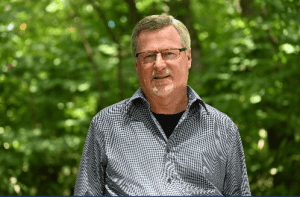Writing that the “Plaintiffs are likely to succeed on the merits,” United States District Judge for the District of Kansas Daniel D. Crabtree issued a temporary restraining order in a lawsuit challenging part of Kansas campaign finance laws.
Fresh Vision is a local community organization formed by James Muir and some of his neighbors to advocate for “preserving the quality of life in our unique neighborhoods while supporting the growth of small local businesses, maintaining safe neighborhoods, and promoting responsible development” in the Overland Park area.
“We’re a group of concerned neighbors who invested a little more than $3,000 to maintain our quality of life in South Overland Park,” Muir, the organization’s president, said in a release from the Institute for Free Speech, which — along with the Ney-Kriegshauser law firm — sued after the Kansas Election Commission ruled the group was a “political action committee” under state law.

Fresh Vision OP’s attorneys argued that there were two major issues with Kansas election law.
The first is the definition of “political committee.” Fresh Vision alleged that state law improperly extends this definition to groups for whom urging voters to elect a candidate is only an incidental purpose of their activities rather than the group’s major purpose.
The second is the state’s “extremely low $100 threshold for triggering burdensome reporting requirements, which includes the threat of jail time for failure to comply. Even a small mailing or a few yard signs could easily surpass the $100 threshold. That would effectively transform a small group of citizens into a political action committee as far as the state is concerned,” according to a release from IFS.
After Fresh Vision endorsed a mayoral candidate, officials threatened the group with hefty fines and imprisonment, claiming it was required to register as a political committee and comply with regulations that would have threatened its existence.
Fearing further enforcement actions, Fresh Vision suspended its activities some three years ago. However, with local elections looming in 2025, the group wanted to resume its advocacy but feared “that doing so [would] trigger a new threat of hefty fines and jail time and force the disclosure of its donor’s identities.”
The court agreed that the requirements constituted a likely First Amendment violation.
Here plaintiffs allege they have lost their First Amendment freedoms of speech and association during Fresh Vision’s three-year (and ongoing) period of dormancy,” Crabtree wrote. “And plaintiffs contend that they have suffered self-censorship. Defendants threatened to enforce political committee reporting requirements — or attendant penalties of a fine or imprisonment — on Fresh Vision.
Crabtree concluded that, under 10th Circuit Court precedent, Kansas’ definition of a PAC “is likely unconstitutionally overbroad. Plaintiffs also have established the requisite irreparable injury by virtue of identifying a chilling effect to their First Amendment speech and association rights.”
Crabtree granted Fresh Vision’s motion for a temporary restraining order and preliminary injunction, in part, by issuing the TRO, but left open — for now — the request for a preliminary injunction pending further argument.
“We are pleased the court recognized that overbroad, ambiguous laws silence protected speech,” Attorney Ryan Kreigshauser said in an emailed statement. “We look forward to fully litigating this matter.”
Charles Miller, senior attorney for the Institute for Free Speech, agreed.
“This ruling is an important step in this process — one that affirms that the First Amendment protects grassroots groups like Fresh Vision OP from burdensome regulations that hinder political speech rights,” Miller said. “The court recognized that Kansas’s overly broad definition of ‘political committee’ likely violates long-standing Supreme Court precedent and chills protected speech. We look forward to securing a permanent victory on the overly broad definition, and on the burdensome $100 reporting threshold still to be litigated, that will protect all Kansans’ right to speak about politics without fear of government reprisal.”



